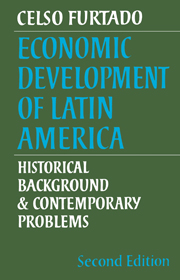Book contents
- Frontmatter
- Contents
- Tables
- Preface to the second edition
- Preface to the first edition
- Abbreviations
- Maps
- PART ONE FROM THE CONQUEST TO THE FORMATION OF NATION-STATES
- PART TWO ENTRY INTO THE SYSTEM OF INTERNATIONAL DIVISION OF LABOUR
- PART THREE THE TRADITIONAL STRUCTURAL PATTERN
- PART FOUR CHARACTERISTICS OF THE INDUSTRIALISATION PROCESS
- PART FIVE REORIENTATION OF DEVELOPMENT IN THE RECENT PERIOD
- PART SIX INTERNATIONAL RELATIONS
- PART SEVEN INTRA-REGIONAL RELATIONS
- PART EIGHT STRUCTURAL RECONSTRUCTION POLICIES
- 22 Economic planning experiments
- 23 Agrarian reforms
- 24 Economic aspects of the Cuban Revolution
- 25 Present problems and prospects
- Bibliography
- Index
23 - Agrarian reforms
Published online by Cambridge University Press: 25 January 2010
- Frontmatter
- Contents
- Tables
- Preface to the second edition
- Preface to the first edition
- Abbreviations
- Maps
- PART ONE FROM THE CONQUEST TO THE FORMATION OF NATION-STATES
- PART TWO ENTRY INTO THE SYSTEM OF INTERNATIONAL DIVISION OF LABOUR
- PART THREE THE TRADITIONAL STRUCTURAL PATTERN
- PART FOUR CHARACTERISTICS OF THE INDUSTRIALISATION PROCESS
- PART FIVE REORIENTATION OF DEVELOPMENT IN THE RECENT PERIOD
- PART SIX INTERNATIONAL RELATIONS
- PART SEVEN INTRA-REGIONAL RELATIONS
- PART EIGHT STRUCTURAL RECONSTRUCTION POLICIES
- 22 Economic planning experiments
- 23 Agrarian reforms
- 24 Economic aspects of the Cuban Revolution
- 25 Present problems and prospects
- Bibliography
- Index
Summary
Roots of the agrarian movements
The economic planning experiments carried out in the Latin American countries, despite their modest aims, served to pinpoint the major obstacles hampering the region's development. By establishing targets and identifying the agents on whose decisions their attainment depended, the development planners initiated discussion of the motives guiding these agents and the means that would have to be mobilised in order to intervene in the behaviour of the policy-makers. It soon became apparent that projecting the expansion of an economic system simply by means of extrapolating rates of growth was limited in scope, and that planning based on the traditional behaviour patterns of the agents involved could not guarantee the attainment of even modest targets. What we needed was a study in depth of the structural elements delimiting the range of options open to the decision-making agents so that the factors hindering the development process could be properly identified. Thus the framework of analysis was imperceptibly broadened as the relevant agents were gradually more clearly identified and observed in their own context. Greater knowledge of the real structures was gradually built up and in many cases this involved going beyond the conventional framework of economic analysis.
The structuralist approach to the development process tended to stress the importance of agrarian problems which, until quite recently, had earned scant attention from economists whose interest had been focused on the study of industrialisation.
- Type
- Chapter
- Information
- Economic Development of Latin AmericaHistorical Background and Contemporary Problems, pp. 251 - 277Publisher: Cambridge University PressPrint publication year: 1977



